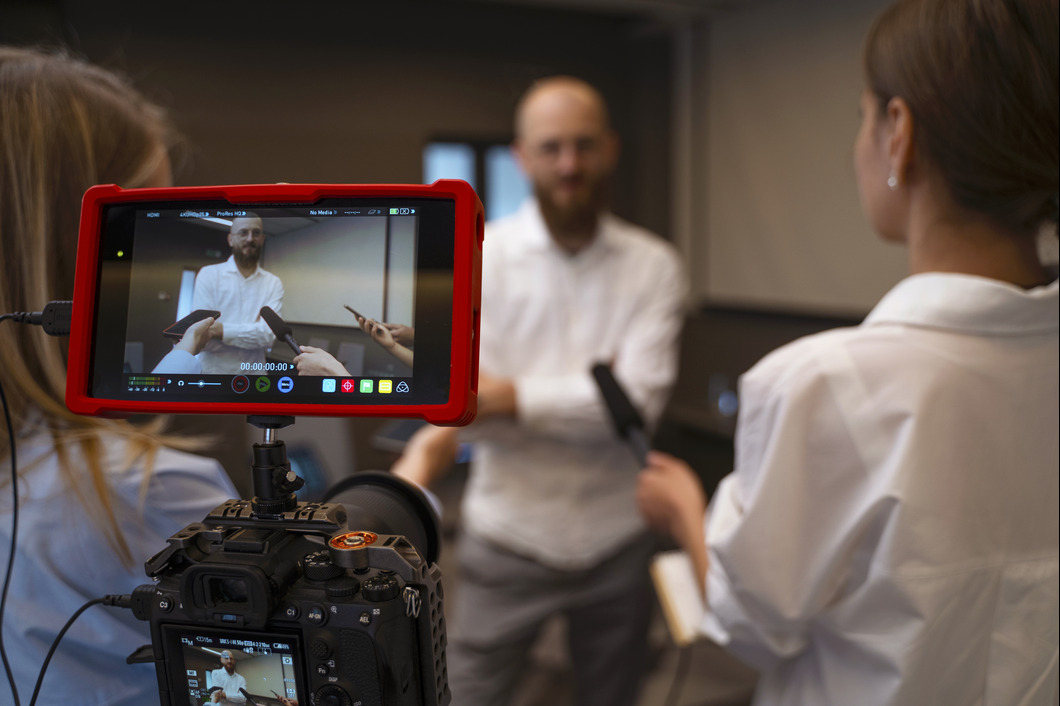Legal video depositions vs written transcripts: Which is more effective for trial?
The Relevance of Legal Video Clip Depositions in Modern Legal Services: What You Ought to Know
Legal video clip depositions have actually come to be crucial in today's legal landscape. They offer a multidimensional view of witness testaments that typical transcripts simply can not match. By catching both spoken and non-verbal communication, these depositions improve the total understanding of a witness's reputation. The effectiveness of video clip depositions hinges on numerous variables, including conformity with legal standards and best practices. Exploring these aspects exposes their true importance in contemporary lawful solutions
What Are Lawful Video Clip Depositions?
Lawful video clip depositions act as an important device in the litigation procedure. They entail recording witness testaments in a video clip layout, catching both verbal and non-verbal interaction. This technique permits lawyers to record the demeanor, expressions, and responses of witnesses, providing a richer context for the testimony. Usually carried out in a regulated environment, these depositions are led by lawyers who ask inquiries while a court press reporter documents the dialogue. The resulting video clip can be important for trial prep work, as it enables attorneys to analyze the trustworthiness of witnesses and improve their methods. In addition, lawful video clip depositions can be utilized in numerous legal contexts, varying from civil disputes to criminal instances. The aesthetic and auditory aspects of video depositions boost the presentation of proof, making it an important part in the modern-day lawful landscape. On the whole, they contribute substantially to the efficiency and efficiency of legal proceedings.

Advantages of Video Depositions Over Standard Methods
Video clip depositions supply many advantages contrasted to traditional approaches of taking witness statements. One substantial advantage is the ability to record both visual and audio components, supplying an extra thorough record of the witness's statements. This dual format boosts clearness and permits attorneys to reference certain subtleties throughout test prep work. In addition, video clip depositions promote remote participation, making it simpler for witnesses that may be not available for in-person looks as a result of geographical constraints or health and wellness issues.Moreover, video depositions can expedite the total deposition process, lowering the moment and expenses connected with travel and logistics. They likewise boost ease of access, as videotaped depositions can be quickly shared among lawful teams and referenced at any moment. This convenience contributes to far better situation management and preparation. On the whole, video depositions stand for a modern, efficient technique to collecting witness testimonies, aligning with the progressing needs of the lawful occupation.
The Duty of Body Movement and Tone in Testimonies

In lawful video clip depositions, body language and tone play essential duties in conveying a witness's reliability and credibility. Nonverbal hints can provide understandings right into a witness's emotion, affecting exactly how their statement is viewed. Recognizing the impact of these aspects is important for attorneys and jurors alike when examining the reliability of a testament.
Nonverbal Interaction Insights
While verbal interaction is frequently emphasized in lawful statements, nonverbal hints such as body movement and tone play a necessary function in conveying reliability and emotion. Viewers of depositions may keep in mind that a witness's posture, motions, and face expressions can greatly affect assumptions of integrity. Consistent eye call may indicate confidence, while staying clear of look could suggest deceit or discomfort. The tone of voice-- its pitch, pace, and quantity-- can give feelings of genuineness or unpredictability. Lawyers must be in harmony with these nonverbal signals, as they often offer vital context that matches spoken words. Recognizing these nuances can enhance the performance of depositions and affect the end result of legal proceedings.
Emotional Tone Effect
The emotional tone shared throughout lawful testimonies significantly affects how a witness is regarded. Body movement, vocal inflections, and faces play crucial functions fit the narrative of a testament. A witness exhibiting self-confidence through steady eye call and a calm tone can instill a sense of dependability and involvement. On the other hand, indications of anxiety, such as fidgeting or an unsteady voice, may cause uncertainty regarding their account. The subtleties of emotional expression can influence the interpretation of truths, making it necessary for legal professionals to acknowledge these hints. In video depositions, the auditory and visual elements integrate, emphasizing the value of emotional tone in sharing sincerity and reliability within the lawful process.
Reputation and Trustworthiness
A vital consider establishing integrity and dependability throughout testimonies lies in the witness's body language and tone of voice. Observers typically rely upon non-verbal cues-- such as eye contact, stance, and gestures-- to evaluate a witness's genuineness. A witness that maintains eye get in touch with and shows open body language might be perceived as even more trusted and truthful than one who avoids eye get in touch with or appears shut off. Additionally, tone of voice plays a vital role; a constant, tranquil tone can strengthen the credibility of the testament, while fluctuations in pitch or volume might increase uncertainties. Inevitably, the combination of body language and vocal tone significantly affects how a witness's declarations are gotten and interpreted in a legal context.
Finest Practices for Conducting Video Depositions
Conducting video clip depositions needs mindful preparation and implementation to ensure a clear and effective presentation of testimony. Initially, it is crucial to choose a silent, well-lit location to lessen disturbances and safe and secure ideal video top quality. The tools must be checked beforehand, consisting of video cameras, microphones, and illumination, to prevent technical issues during the deposition.Next, events entailed have to review the format and procedures in advance, making certain that every person recognizes their functions. The deponent needs to be oriented on the process, including how to respond clearly and concisely.Additionally, preserving a professional attitude throughout the session is essential. This consists of avoiding from talking over each other and confirming that all concerns are guided appropriately. It is essential to tape-record the deposition in a layout that permits for simple playback and evaluation, preserving the integrity of the testimony for future usage.
Legal Considerations and Compliance Issues
Exactly how do legal factors to consider and compliance problems impact the performance of video clip depositions? Lawful professionals should browse an intricate landscape of laws, making sure that video depositions abide by jurisdictional policies and criteria. Conformity with regulations worrying privacy, approval, and taping techniques is necessary. For example, acquiring explicit permission from all parties entailed is required to avoid legal repercussions.Additionally, the admissibility of video clip evidence in court can rest on compliance with procedural demands. Ensuring that the equipment made use of fulfills technical requirements is additionally vital, as bad quality can undermine the deposition's reliability.Moreover, lawyers must understand any type of particular state legislations that control video depositions, as these can vary substantially. Failure to attend to these factors to consider can not only endanger the stability of the deposition yet also affect the total situation technique, inevitably influencing the customer's legal results.
How Video Clip Depositions Impact Jury Perception
While video depositions can offer as effective tools in lawful proceedings, their impact on court perception is considerable. The acoustic and aesthetic aspects of video clip recordings offer jurors with a much more complete understanding of witness temperament, trustworthiness, and emotional responses. This multimedia method can boost the jurors' ability to analyze the integrity of testament compared to conventional text-based transcripts.Moreover, video depositions permit jurors to observe body movement, tone of voice, and faces, every one of which can impact their interpretation of the witness's statements. The visibility of a witness on display can humanize them, cultivating empathy and connection, which might sway jurors' opinions. On the other hand, a witness who shows up evasive or undependable on video may cause adverse assumptions that affect a court's choice. Inevitably, the dynamic nature of video depositions plays check these guys out an essential function fit exactly how jurors interpret evidence and reach their judgments.
The Future of Video Clip Depositions in Legal Technique
As improvements in technology remain to reshape the lawful landscape, the future of video depositions is poised for significant advancement. Innovations such as expert system, digital fact, and improved video clip conferencing devices are anticipated to improve the deposition procedure and improve access. Lawful professionals might utilize AI-driven analytics to analyze witness reputation and situation stamina a lot more effectively.Moreover, the assimilation of virtual truth could enable juries to experience immersive simulations of depositions, supplying much deeper context and understanding. In addition, the pattern towards remote depositions is likely to persist, providing better flexibility for attorneys and customers alike.As remote job comes to be increasingly stabilized, video depositions will likely come to be standard method, minimizing expenses and time constraints connected with traditional techniques. Overall, these technological improvements promise to enhance the effectiveness, efficiency, and ease of access of video clip depositions in lawful method, inevitably changing exactly how attorneys get ready for trial.
Frequently Asked Inquiries
Just How Much Do Legal Video Clip Depositions Commonly Price?

Can Video Depositions Be Used in Any Kind Of Kind of Situation?
Video clip depositions can be utilized in numerous kinds of cases, consisting of civil, criminal, and household law. Their versatility permits attorneys to present witness statements efficiently, adjusting to the particular demands of different lawful scenarios.
What Tools Is Needed for a Video Clip Deposition?
To conduct a video deposition, important equipment includes a top notch electronic camera, microphone, lighting, and a dependable recording gadget. Furthermore, a computer system with editing and enhancing software program might be necessary for post-production and formatting the final video.
The length of time Does a Common Video Deposition Last?
A regular video clip deposition lasts in between 2 to 4 hours, relying on the intricacy of the instance and the variety of inquiries presented. Prolonged sessions might happen, however breaks are normally included for individual comfort.

Are Video Clip Depositions Admissible in Court?
Video clip depositions are usually permissible in court, given they stick to lawful requirements and regulations of proof. Their usage improves clearness and preserves witness testimony, assisting in the judicial procedure throughout trials and hearings. Lawful video clip depositions have actually come to be important in view publisher site today's legal landscape. Additionally, legal video depositions can be used in various lawful contexts, varying from civil disputes to criminal situations. Furthermore, video depositions assist in remote involvement, making it easier for witnesses that might be unavailable for in-person looks due to geographical restraints or health and wellness issues.Moreover, video depositions can quicken the general deposition process, lowering the time and costs connected with travel and logistics. Making sure that the tools used meets technological criteria is also vital, as bad quality can weaken the deposition's reliability.Moreover, attorneys have to be conscious of any kind of certain state laws that regulate video depositions, as these can differ greatly. In addition, the trend towards remote depositions is likely to continue, offering higher flexibility for clients and lawyers alike.As remote work ends up being increasingly normalized, video clip depositions will likely become typical method, lowering costs and time restrictions associated with conventional approaches.